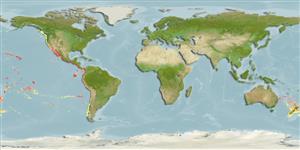Teleostei (teleosts) >
Anguilliformes (Eels and morays) >
Congridae (Conger and garden eels) > Congrinae
Etymology: Bathycongrus: Greek, bathys = deep + Latin, conger = conger (Ref. 45335).
More on author: Garman.
Environment: milieu / climate zone / depth range / distribution range
Ecology
Marine; bathydemersal; depth range 165 - 935 m (Ref. 9292). Deep-water
Eastern Pacific: southern Canada to Chile.
Size / Weight / Age
Maturity: Lm ? range ? - ? cm
Max length : 100.0 cm TL male/unsexed; (Ref. 9292)
Life cycle and mating behavior
Maturity | Reproduction | Spawning | Eggs | Fecundity | Larvae
Smith, D.G., 1995. Congridae. Congrios. p. 1026-1035. In W. Fischer, F. Krupp, W. Schneider, C. Sommer, K.E. Carpenter and V. Niem (eds.) Guia FAO para Identification de Especies para lo Fines de la Pesca. Pacifico Centro-Oriental. 3 Vols. FAO, Rome. (Ref. 9292)
IUCN Red List Status (Ref. 130435: Version 2024-2)
Threat to humans
Harmless
Human uses
Tools
Special reports
Download XML
Internet sources
Estimates based on models
Preferred temperature (Ref.
123201): 7.2 - 12.3, mean 9.4 °C (based on 74 cells).
Phylogenetic diversity index (Ref.
82804): PD
50 = 0.5000 [Uniqueness, from 0.5 = low to 2.0 = high].
Bayesian length-weight: a=0.00063 (0.00029 - 0.00138), b=3.18 (3.00 - 3.36), in cm total length, based on LWR estimates for this (Sub)family-body shape (Ref.
93245).
Trophic level (Ref.
69278): 4.1 ±0.5 se; based on size and trophs of closest relatives
Resilience (Ref.
120179): Low, minimum population doubling time 4.5 - 14 years (Preliminary K or Fecundity.).
Fishing Vulnerability (Ref.
59153): High vulnerability (60 of 100).
